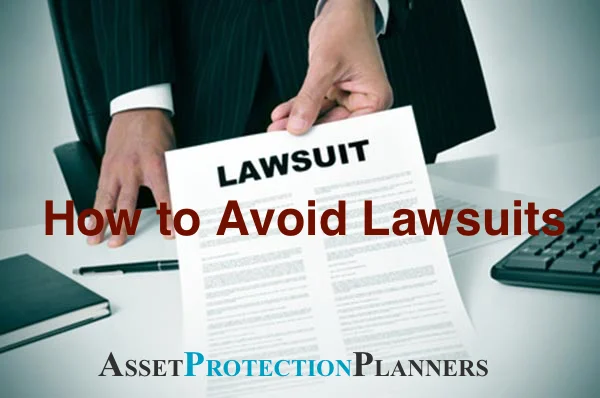
When people think of asset protection strategies, they tend to think of tools that protect you after you lose a lawsuit. However, those aren’t the only strategies available. Several asset protection strategies can help you avoid lawsuits altogether.
In this article, we’ll teach you five smart strategies to avoid lawsuits. These ideas help you protect assets from lawsuits by keeping your name out of public records and making your assets more difficult to locate:
- Why Asset Protection Is Necessary
- 1. Asset Protection Trusts
- 2. Land Trusts
- 3. Limited Liability Companies (LLCs)
- 4. Title-Holding Trusts
- 5. Equity Stripping

Why Asset Protection Is Necessary
In the medical profession, it’s often said that an ounce of prevention is worth a pound of cure. That adage also holds true for legal matters. If you can stop a lawsuit from happening, you never need to worry about losing your assets to judgment creditors. Plus, avoiding a lawsuit will ultimately save you money, as you won’t have to pay a lawyer to fight against creditor claims.
1. Asset Protection Trusts
What it is: Asset protection trusts (APTs) are trust structures designed to keep assets safe from creditors. They are made up of a settlor, trustee, and beneficiary. The settlor establishes the trust and funds it, the trustee manages the assets placed into the trust, and the beneficiary receives distributions and inheritance from the trust.
How it prevents lawsuits: An APT works by legally shifting ownership of assets from the settlor to the trustee. If a lawyer ever tries to start a lawsuit by running an asset search on the settlor of the trust, the lawyer will see that the settlor doesn’t own the assets directly. This discourages lawsuits, as lawyers know the trust provides a blockade to them laying claim to a sizable portion of the settlor’s assets.
Where to set one up: Asset protection trusts can be set up either domestically or in an overseas jurisdiction. In general, offshore asset protection trusts are stronger, as overseas jurisdictions like Nevis and the Cook Islands are not required to follow U.S. court orders.
Assets it protects: Asset protection trusts can be used to keep many types of assets type safe from lawsuits, including liquid cash and investment accounts.
2. Land Trusts
What it is: Land trusts are a convenient way to own real estate privately. Using a land trust, a real estate owner can transfer the deed to the trust. The trust/trustee are then listed as the official owners of the property. This keeps the property owner’s name out of public records.
How it prevents lawsuits: Lawyers often start lawsuits by looking through public records to find people with high value real estate holdings. When a land trust holds property, the owner’s name remains private, which greatly reduces their likelihood of being sued. That said, the land trust provides for privacy of ownership and lawsuit prevention. In Florida, Illinois, and Indiana, statutes provide for a degree of asset protection as well.
Assets it protects: Land trusts are often used to hide the ownership of rental properties, vacation homes, and investment properties. Likewise, they are used to own personal residences privately.

3. Limited Liability Companies (LLCs)
What it is: A limited liability company (LLC) is a business structure that helps to prevent the “spillover” of liability. People who are members of LLCs can enjoy protection from business lawsuits impacting their personal asset. Conversely, in many jurisdictions, the LLC’s assets are protected from personal lawsuits against its members.
How it prevents lawsuits: LLCs can work in tandem with the privacy and protective benefits of land trusts and asset protection trusts. In addition, they can also help to prevent lawsuits. LLCs effectively create a wall between your personal assets and the assets held by the LLC. When your assets are separated in this manner, it can discourage lawyers from going after your wealth. That is, they’d often have to file multiple lawsuits to get their hands on a significant portion of your wealth.
Assets it protects: LLCs can protect countless assets, including vehicles, real estate, bank accounts, office equipment, and even other businesses.

4. Title-Holding Trusts
What it is: A title-holding trust is similar to a land trust for vehicles and other titled assets. Like a land trust, it hides your name from ownership records associated with your vehicles.
How it prevents lawsuits: When a lawyer runs an asset search, they can also see your cars, boats, and other titled assets. If you own expensive cars and boats, or even maintain a collection of vehicles, lawyers can view your assets as easy, accessible targets. Placing these items into a title-holding trust makes them much harder for lawyers to find.
Assets it protects: Title-holding trusts work best at protecting cars, boats, trucks, and other items that must be titled with local governments.
5. Equity Stripping
What it is: Equity stripping is a method asset protection professionals use to remove equity from a piece of real estate. During this process, you record mortgages or other types of liens against your property. People often use a domestic or overseas LLC that you control to hold the lien. Later, when a threat arises, the LLC can sell the mortgages to a third-party lender. One can secure the resulting proceeds in an asset protection trust.
How it prevents lawsuits: Equity stripping decreases the equity from a piece of property. When a lawyer runs an asset search, they’ll quickly see that you have no equity to pursue.
Assets it protects: Equity stripping, like land trusts and title holding trusts, are used to protect real estate holdings and other assets.
Asset Protection Planners Can Help You Avoid Lawsuits
The biggest reward an asset protection strategy can afford you is a lawsuit that didn’t happen. Lawsuits are expensive whether you win or lose, and if you can avoid one, you save huge sums of money on legal fees before your assets are even at risk.
If you’re ready to implement strategies to avoid lawsuits, Asset Protection Planners is here to help. Schedule a free consultation to see how our experts can protect your assets from lawsuits.


